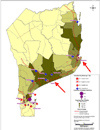Analysing the quality of routine malaria data in Mozambique
- PMID: 14998435
- PMCID: PMC395838
- DOI: 10.1186/1475-2875-3-3
Analysing the quality of routine malaria data in Mozambique
Abstract
Background: In Mozambique, malaria is the principal cause of morbidity and mortality. Efforts are being made to increase control activities within communities. These activities require management decisions based on evidence of malaria incidence. Although some data generated are of poor quality, there is little research towards improving the reporting systems.
Methods: An analysis of the quality of routine malaria data was performed in selected districts in Southern Mozambique from August to September 2003. The aim was to assess the quality of the source data in terms of completeness, correctness and consistency across management levels.
Results: Analysis revealed primary data to be of poor quality. The diversity of reporting systems with limited coordination give rise to redundancies and wastage of resources. There was evidence of "invention" of data in health facilities contributing to an incorrect representation of malaria incidence. Large, "non-clinical", time-based variations of malaria cases due to reporting delays were also noted, contributing to false alerts of outbreaks.Furthermore, targets established in the national strategic plan for malaria cannot be calculated through the existing systems; this is the case, for example, for data related to pregnant women and children under-five years.
Discussion and recommendations: The existing reporting system for malaria is currently not satisfying the information needs of managers. It is suggested that one standardized system, including the creation of one form to include the essential variables required for the calculation of key indicators by age, gender and pregnancy status, and to establish a national database that maps malaria by location.
Figures






References
-
- Alnwick D. Rejecting 'business as usual' for Malaria Control in Emergencies. Health in Emergencies WHO. 2001. pp. 2–6.
-
- White NJ, Breman JG. Malaria and Babesiosis: Diseases Caused by Red Blood Cell Parasites. In: Braunwald E, Isselbacher KJ, Kasper DL, Hauser SL, Longo DL, Jameson JL, editor. Harrison's Principles of Internal Medicine. 15. 2001. pp. 1–21.
-
- Mozambique CCC. Mozambican National Initiative To Accelerate Access To Prevention, Care, Support, And Treatment For Persons Affected By HIV/AIDS, Tuberculosis And Malaria. Global Fund To Fight AIDS, Tuberculosis and Malaria Global Fund Secretatiat. 2002.
MeSH terms
LinkOut - more resources
Full Text Sources
Medical

